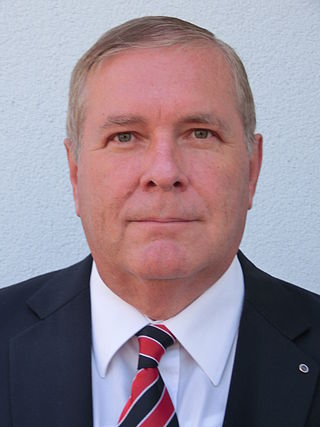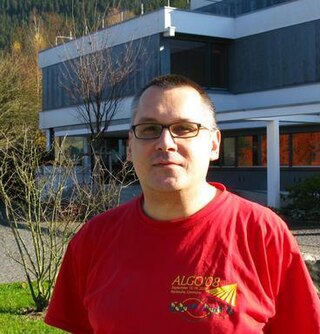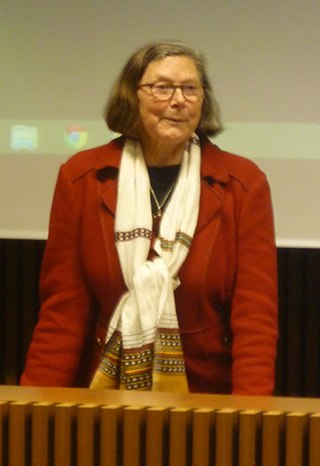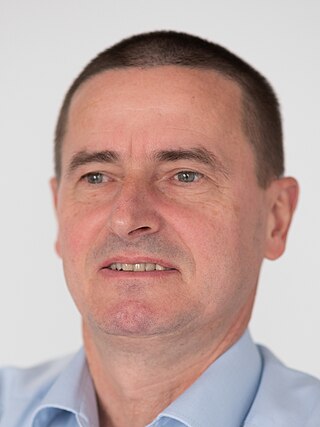Related Research Articles

TU Wien is one of the major universities in Vienna, Austria. The university finds high international and domestic recognition in teaching as well as in research, and it is a highly esteemed partner of innovation-oriented enterprises. It currently has about 28,100 students, eight faculties and about 5,000 staff members.

Gerhard Chroust is an Austrian systems scientist, and Professor Emeritus for Systems Engineering and Automation at the Institute of System Sciences at the Johannes Kepler University Linz, Austria. Chroust is an authority in the fields of formal programming languages and interdisciplinary information management.

Josef Alexander Kozeny was an Austrian hydraulic engineer and physicist. Today he is mainly remembered for the Kozeny–Carman equation which describes fluid flowing through a packed bed of solids.
The Wittgenstein Award is an Austrian science award supporting the notion that "scientists should be guaranteed the greatest possible freedom and flexibility in the performance of their research." The prize money of up to 1.5 million euro make it the most highly endowed science award of Austria, money that is tied to research activities within the five years following the award. The Wittgenstein-Preis is named after the philosopher Ludwig Wittgenstein and is conferred once per year by the Austrian Science Fund on behalf of the Austrian Ministry for Science.

Siegfried Selberherr is an Austrian scientist in the field of microelectronics. He is a professor at the Institute for Microelectronics of the Technische Universität Wien . His primary research interest is in modeling and simulation of physical phenomena in the field of microelectronics.
Hannelore Eva Kreisky, née Zgraja is an Austrian political scientist and jurist.
The Gabriele Possanner State Prize is a state award for feminist research in Austria, named for Gabriele Possanner. It was established in 1997, and is awarded every second year by the Federal Ministry of Science and Research.

Gabriele Possanner was the first female doctor to practice medicine in Austria.

Gerhard J. Woeginger was an Austrian mathematician and computer scientist who worked in Germany as a professor at RWTH Aachen University, where he chaired the algorithms and complexity group in the department of computer science.

Christiane Floyd is an Austrian computer scientist. In 1978, she became the first female professor of computer science in Germany, and was a pioneer of evolutionary participatory software design—a precursor to open-source software development.
Helmut Veith was an Austrian computer scientist who worked on the areas of computer-aided verification, software engineering, computer security, and logic in computer science. He was a Professor of Informatics at the Vienna University of Technology, Austria.

Renée Schroeder is an Austrian researcher and university professor at the Department of Biochemistry at the Max F. Perutz Laboratories of the University of Vienna and the Medical University of Vienna.
Stefan Szeider is an Austrian computer scientist who works on the areas of algorithms, computational complexity, theoretical computer science, and more specifically on propositional satisfiability, constraint satisfaction problems, and parameterised complexity. He is a full professor at the Faculty of Informatics at the Vienna University of Technology, the head of the Algorithms and Complexity Group, and co-chair of the Vienna Center for Logic and Algorithms of TU Wien (VCLA).

Ulrike Diebold is an Austrian physicist and materials scientist who is a Professor of Surface Science at TU Vienna. She is known for her groundbreaking research on the atomic scale geometry and electronic structure of metal-oxide surfaces.
Agata Ciabattoni is an Italian mathematical logician specializing in non-classical logic. She is a full professor at the Institute of Logic and Computation of the Faculty of Informatics at the Vienna University of Technology, and a co-chair of the Vienna Center for Logic and Algorithms of TU Wien (VCLA).
Ivona Brandić is a Bosnian–Austrian computer scientist known for her research on cloud computing. She is University Professor for High Performance Computing Systems in the Institute of Information Systems Engineering of TU Wien.
Geraldine Fitzpatrick is an Australian professor and academic researcher who serves as the head of the Human-Computer Interaction Group at TU Wien since 2009. Her research is interdisciplinary at the intersection of social and computer sciences.
Silvia Miksch is an Austrian computer scientist working in information visualization, particularly for time-oriented and medical data. She is head of the Centre for Visual Analytics Science and Technology at TU Wien.

Eduard Gröller' is an Austrian computer scientist and professor at the Technische Universität Wien.

Elfriede Tungl was an Austrian civil engineer. She was the first Austrian woman to earn a doctorate in civil engineering and in 1973 became the first female associate professor at the Vienna University of Technology.
References
- 1 2 3 4 Lechner, Isabella (15 January 2012). ""Hätte ich emeritieren können, wäre ich geblieben"". derStandard.at (in German). Retrieved 24 October 2019.
- 1 2 "Ina Wagner" (in German). Stadt Wien. Retrieved 24 October 2019.
- ↑ "Gabriele Possanner-Staatspreisträgerin 2011" (in German). Bundesministerium für Bildung, Wissenschaft und Forschung. Archived from the original on 24 October 2019. Retrieved 24 October 2019.
- ↑ "Members of the Bioethics Commission". Federal Chancellery. Retrieved 24 October 2019.